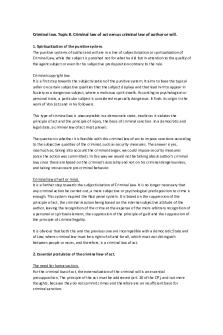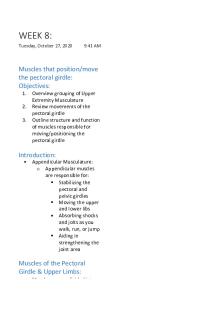08 - Lecture notes 8 PDF

| Title | 08 - Lecture notes 8 |
|---|---|
| Course | Equity |
| Institution | Charles Darwin University |
| Pages | 14 |
| File Size | 278.8 KB |
| File Type | |
| Total Downloads | 17 |
| Total Views | 138 |
Summary
Legal_Estoppel...
Description
© AG James 2017
LWZ010 Equity Resource Paper No. 08.1 EQUITABLE DOCTRINE OF ESTOPPEL Part 1 – Legal Concept of Estoppel
Lecturer’s Observations: When thinking of a bung or cork we can see there is a similarity between the “estoppel” and the contemporary word “stopper”. The Concise Oxford Dictionary tells us that the word “estop” is a verb used in the legal system to convey a meaning in the nature of: “a bar which prevents or precludes a person from doing (or saying) something.” The Concise Oxford Dictionary also tells us that the word “estoppel” is the noun form of estop and is used in law to describe the process of: [in law] “being precluded from a course of action by one’s own previous behaviour”. Examined from a professional standpoint, Butterworth’s “Words and Phrases Legally Defined” provides a number of illuminating observations on the topic. A selection of relevant remarks from that publication are: •
“There is said to be an estoppel where a party is not allowed to say that a certain statement of fact is untrue, whether in reality it is true or not.”
•
[Estoppel] “may therefore be defined as a disability whereby a party is precluded from alleging or proving in legal proceedings that a fact is otherwise than it has been made to appear by the matter giving rise to that disability”.
•
“The doctrine of estoppel is one of the most flexible and useful in the armoury of the law. It has evolved during the last 150 years in a sequence of separate developments: proprietary 08.1 RP LWZ210 Legal Estoppel Page 1 of 14
© AG James 2017
estoppel, estoppel by acquiescence and promissory estoppel. At the same time it has been sought to be limited by a series of maxims: Estoppel is only a rule of evidence; estoppel cannot give rise to a cause of action; estoppel cannot do away with the need for consideration, – and so forth. •
“All these [varieties of estoppel] can now be seen to merge into one general principle shorn of limitations. When the parties to a transaction proceed on the basis of an underlying assumption (either of fact or of law and whether due to misrepresentation or mistake, makes no difference) on which they have conducted the dealings between them, neither of them will be allowed to go back on that assumption when it would be unfair or unjust to allow him to do so…..”
A conventional professional expression of the concept can be found in the Osborn’s Law Dictionary definition: “The rule of evidence or doctrine of law which precludes a person from denying the truth of some statement formerly made by him, or the existence of fact which he has by word or conduct led others to believe in”.
FACTS: As part the activities of a corporate partnership of the three companies, the directors of those companies executed documents by which the directors each gave guarantees of payment of debts incurred by a company referred to as the principal debtor. For the purposes of the venture, however the actual debts were incurred by a different company from the company that was specified in the guarantee documents as being the principal debtor. HELD: The directors were not permitted to deny (they were estopped from denying) that they had guaranteed the obligations of the true debtor notwithstanding that under the formal text of the guarantee documents they might have done so. The case is a decision in law not equity. Its outcome, of course, was dependent on its particular facts. However the case contains an extensive discussion of law’s concept of estoppel. In particular, an introductory statement of the legal policy underlying the concept of estoppel is provided by: 08.1 RP LWZ210 Legal Estoppel Page 2 of 14
© AG James 2017
Dicta per McHugh JA: “The basic purpose of the doctrine of estoppel is to prevent the injustice that results from a person repudiating the foundation of a belief or assumption he or she has induced when the repudiation will cause harm to the person holding that belief or acting on that assumption” Varieties of Estoppel There are various estoppel doctrines established by both law and by equity. To achieve the clearest picture with respect to equity’s principles of estoppel it is desirable to begin with an examination of law’s doctrines of estoppel. Legal Estoppel In law, the concept of estoppel is relevant in five (5) manifestations. They are usually known by the names now given but sometimes different names are used in the cases for one or other of these particular concepts. The five (5) classes of legal estoppel are: •
Estoppel By Deed;
•
Estoppel By Judgement;
•
Estoppel By Conduct;
•
Estoppel By Representation; and
•
Estoppel By Convention
1.
Estoppel by Deed
When law speaks of a deed that is a reference to a binding written commitment that does not require proof of consideration. That is so because it is expressly executed in a particular solemn manner. A deed can be used to embody a contract but is also effective to document other non-contractual obligations. Typically, after identifying the parties, a deed will contain a preamble which recites facts that the parties wish to put on record – such as, for example, the fact that they have had a dispute over some particular matter. This element of the deed is usually known as "the recitals". Then the deed will set out the operative parts of the document – that is, the promises made and the obligations undertaken by the parties. The purpose of the preamble (the recitals) sometimes serves as a statement of objectives but commonly, by making statements of fact, it is usually a means of recording the history of the dealings between the parties. 08.1 RP LWZ210 Legal Estoppel Page 3 of 14
© AG James 2017
Doctrine of estoppel by deed: Where the parties do record statements of fact in their deed, all parties are bound to the truth of any such statement of fact. In any subsequent legal proceedings concerning the subject matter of the deed, no party to the deed will be permitted to deny the truth of any statement of fact which is contained in the deed. At law, a party to a deed who is precluded from denying any statement of fact incorporated in the deed will be said to be bound by force of the legal doctrine of estoppel by deed. For an example see the case of: Offshore Oil NL v Southern Cross Exploration NL (1985) 3 NSWLR 337 FACTS: On 25 November 1982 Offshore Oil and Southern Cross entered into a deed (“the settlement deed”) recording the terms of an agreement between them by which they agreed to compromise and settle a dispute between them regarding a “farm-in” agreement under which they had operated a Joint Venture and Operating Agreement (JVOA). The dispute concerned the fact that Southern Cross had been in arrears in the payment of its financial contributions (calls) to the JVOA. The recitals to the settlement deed contained these statements: "D. The following amounts are due and payable by Southern Cross: (i) $840,000 pursuant to call No AFE 751015 payable on 1 July 1982; (ii) $285,240 pursuant to call No RFA 751017 payable on 7 September 1982; (iii) $59,223...- etc - ...." The operative part of the settlement deed required Southern Cross to pay the outstanding sums by instalments and in the event of failure to pay any instalment Southern Cross would forfeit its interest in the JV subject matter and be liable to be sued for the entire balance then unpaid. Southern Cross failed to make the first payment required by the settlement deed and Offshore Oil sued to recover the entire balance then unpaid as a debt pursuant to that deed. Southern Cross pleaded a defence which, inter alia, denied the validity of the call notices which had created the first dispute which had culminated in the settlement deed. The plaintiff replied that the settlement deed precluded Southern Cross from denying the validity of the calls. HELD: Southern Cross was not entitled to deny (was estopped from denying) the truth of what it had agreed to in the recitals to the settlement deed. The court expressed the applicable principle to be that when parties have acted in a transaction 08.1 RP LWZ210 Legal Estoppel Page 4 of 14
© AG James 2017
on the agreed assumption that a given state of facts is to be accepted between them as true, then, as regards that transaction, each will be estopped, as against the other, from questioning the truth of the statement so assumed. The court’s reasoning made clear that for the purposes of the legal doctrine of estoppel by deed: (a) It is not necessary that the facts recorded in the deed be true. The issue is whether the truth of those facts has been assumed by the parties for the purposes of the transaction agreed to and documented in the deed. (b) The estoppel so created only operates in proceedings arising out of the particular transaction documented in the deed and entered into on the basis of the facts recorded in that deed. (c) The statements of fact contained in a deed do not preclude a party to the deed from disputing the truth of those facts in some other proceedings based on a different transaction. Lecturer’s Observations: It speculated by scholars that with the progression and refinement of the law by future judicial authorities, in the end result it is probable that the title “estoppel by deed” will not restrict this doctrine to written instruments that are capable of the formal description "deed". It is more likely, given the usages of commerce and industry, that any form of written agreement will be regarded as a "deed" for the purposes of the doctrine. 2.
Estoppel By Judgement
The legal doctrine of Estoppel by Judgement requires that, after a case has been adjudicated, all parties to that case will be estopped from denying any fact decided in the case (unless, at the relevant time, an appeal is pending and not resolved). The reasons for this principle are practical. The principle of Estoppel by Judgement: 1.
Avoids the perpetuation of litigation;
2.
Avoids conflicting judgements; and
3.
Promotes the public’s interest in certainty.
There are three (3) recognised sub-categories of Estoppel by Judgement. These are: •
Issue Estoppel
08.1 RP LWZ210 Legal Estoppel Page 5 of 14
© AG James 2017
This application of the principle of Estoppel by Judgement is a rule of the law of evidence which requires that issues (whether of fact or of law) adjudicated in a particular dispute between particular parties, cannot be raised again, between the same parties, in other litigation. •
Res Judicata The Latin phrase “res judicata” translates into English as “a thing adjudicated”. The phrase is used to refer to the particular application of Estoppel by Judgement for situations where a legal dispute has been resolved by decision of an authoritative court. The policy of this application of the doctrine is that the matters in dispute in the action which has been adjudicated cannot be raised again, in another dispute, between the same parties to the case.
•
Anshun Estoppel The description “Anshun estoppel” refers to a principle to the effect that parties who have already been in litigation cannot raise a claim or defence in other litigation which could have been raised in the original litigation where the failure to raise that point in first case was negligent, inadvertent or accidental.
The case by which the Anshun Estoppel sub- category of the main principle received its name is: Port of Melbourne Authority v Anshun Pty Ltd (1981) 147 CLR 589 FACTS: The Port Authority took proceedings against Anshun to enforce a contract by which Anshun had agreed to indemnify the Port Authority against legal proceedings brought by others who claimed negligence against the Port Authority arising out of Anshun’s activities in the Port. The Port Authority’s claim was for $53,632.89 paid by it to a litigant for legal costs and disbursements in a case in which both the Port Authority and Anshun had been defendants. In that original case the Port Authority could have raised the indemnity but had failed to do so. HELD: On the basis that the Port Authority could have raised the claim for indemnity in the original case, Anshun succeeded in a defence in the second proceeding to the effect that the Port Authority should be estopped from relying on the indemnity agreement in that second proceeding. Note: In some authorities and jurisdictions, the Estoppel by Judgement variety of estoppel is also known as Estoppel by Record. 08.1 RP LWZ210 Legal Estoppel Page 6 of 14
© AG James 2017
3.
Estoppel By Conduct
This principle was once called Estoppel in Pais. That description is occasionally used in contemporary legal analysis and authorities. The phrase "in pais" is a Law-French expression which denotes a matter of fact (in contrast to a matter of record). The essence of the underlying principle of Estoppel by Conduct is that where a party’s conduct implies some representation of fact, that party may be precluded by law from acting contrary to the representation implicit in his or her conduct if another party has relied on the representation implicit in that conduct and will suffer detriment should the representing party act contrary to the representation implicit in his or her past conduct. It must not be thought that law's restraint on a party from acting inconsistently with a representation by conduct (or otherwise) will be unconditional. The principle does not apply irrespective of the circumstances. As will be seen, this form of estoppel will not be activated unless a party, entitled to do so, relies on the implicit representation to his or her detriment. This principle is now regarded as merely an example of the following category which is Estoppel by Representation. The same principles are applicable to both doctrines with different terminology used. 4.
Estoppel by Representation
An example of the legal doctrine of Estoppel by Representation can be seen in the case of: Greenwood v Martins Bank Ltd [1933] AC 51 FACTS: A husband and wife had a joint account with Martins Bank (“the bank”). The husband closed that account and opened an account in his sole name without any authority for the wife to draw cheques on it. However the wife repeatedly forged her husband's signature to cheques and thereby drew out money from the second account without the husband's authority and contrary to his wishes. The husband became aware of the forgeries but was persuaded by his wife to say nothing. He maintained silence for eight months. Finally he disclosed the forgeries to the bank with the result that the wife committed suicide. At a later time, the husband brought an action against the bank to recover the money paid out on cheques where his signature had been forged. The bank could not claim indemnity against the estate of the wife because its legal right of action against her, for the tort of misappropriation, abated on her death. HELD:
08.1 RP LWZ210 Legal Estoppel Page 7 of 14
© AG James 2017
The husband’s conduct of not disclosing the forgeries to the bank when he became aware of them denied the bank the opportunity to take action against the wife for the recovery of the money wrongfully paid on the forged cheques. The husband’s conduct of non-disclosure constituted a representation to the bank that there had been no impropriety on the part of the wife and that there was no call for any action to be taken against the wife. By reason of that detriment to the bank, the husband was precluded (estopped) from subsequently asserting that the signatures to the cheques were forgeries. 5.
Estoppel by Convention
Lecturer’s observations: Estoppel by convention is the terminology used to apply to situations where parties to a transaction (necessarily a contractual relationship) act on a mutually assumed state of facts or law (whether based on an assumption that is common by origin or which originated with one of the parties and was adopted - or acquiesced to - by the other party after having been made known by the first party). The description “by convention” is a reference to the conventional behaviour of the parties. A thorough understanding of legal estoppel generally may be derived from an effective understanding of estoppel by convention as it is one of the more common of the legal concepts of estoppel in law as it arises mainly from contractual relationships. Estoppel by convention is a legal (not equitable) doctrine. The doctrine is relevant to situations where parties to a transaction act on a mutually assumed state of facts or law. The assumption may be one that is common by origin (i.e., made by both parties) or it may originate with one of the parties and be adopted (or acquiesced to) by the other party after having been made known by the first party. The doctrine is conveniently reviewed and propounded in a joint judgement of the entire bench of the NSW Court of Appeal which provides a comprehensive overview. See Ryledar Pty Ltd v Euphoric Pty Ltd [2007] NSWCA 65; 69 NSWLR 603: Joint Dicta per Mason P, Tobias JA, and Campbell JA: “194 On the other hand estoppel by convention is a form of estoppel founded upon an assumed state of affairs by the parties whether as to a matter of fact or a matter of legal effect which both will be estopped from denying: Con-Stan Industries of Australia Pty Ltd v Norrich Winterthur Insurance (Australia) Ltd [1986] HCA 14; (1986) 160 CLR 226 at 244-245. 08.1 RP LWZ210 Legal Estoppel Page 8 of 14
© AG James 2017
Lecturer’s observations: The court is only saying that the common assumption is eligible to be a foundation; this paragraph should not be interpreted as meaning that where ever there is a common assumption, in a contractual context, the parties will be bound to that assumption. For either of the parties to be precluded (estopped) from departing from the common assumption, more elements are required – see later. Joint Dicta from Ryledar case continued: “That assumed state of affairs takes as a given the terms of the contract as known to and understood by the parties but from which the parties have departed for the purpose of their furtherance of their relationship under the contract. “195 As Dixon J therefore observed in Grundt v Great Boulder Pty Gold Mines Ltd [1937] HCA 58; (1937) 59 CLR 641 at 676, belief in the correctness of the facts or state of affairs assumed is not always necessary. Parties may adopt as the conventional basis of a transaction between them an assumption which they know to be contrary to the actual state of affairs. “196 In his recent book1 Estoppel by Conduct and Election, Handley described estoppel by convention in the following terms (at par 8-001): ‘When parties make a statement of fact or of mixed fact and law the conventional basis of their transaction ... both are estopped from questioning its truth for the purpose of that transaction. Estoppels by convention can be created ad hoc, expressly, by a course of dealing, or by other acts and declarations. In such a case ‘there must be some mutually manifest conduct by the parties’ with the intention of effecting their legal relationship.’ Lecturer’s observations: In these remarks the learned author is providing an insight as to the foundation of the title “estoppel by convention” – it is a reference to the judicial phenomenon by which sometimes one of the parties will be precluded from deviating from their conventional pattern of behaviour. Joint Dicta from Ryledar case continued: “197 In Amalgamated Investment & Property Co Ltd v Texas Commercial International Bank Ltd (in liq) [1982] QB 84, Lord Denning MR observed (at 121):
1
Author Kenneth Handley; Publisher Sweet & Maxwell Ltd; Edition 2nd Edition ISBN 9780414028449. 08.1 RP LWZ210 Legal Estoppel Page 9 of 14
© AG James...
Similar Free PDFs

08 - Lecture notes 8
- 14 Pages

Module 08 - Lecture notes 8
- 3 Pages

08-Fases - Lecture notes 8
- 29 Pages

8 - Lecture notes 8
- 21 Pages

8 - Lecture notes 8
- 21 Pages

Lecture Notes 10 08 2020
- 3 Pages

8 Midwifery - Lecture notes 8
- 3 Pages

Taxation 8 - Lecture notes 8
- 2 Pages

Week 8 - Lecture notes 8
- 6 Pages

Dox 8 - Lecture notes 8
- 21 Pages

Lesson 8 - Lecture notes 8
- 2 Pages

Assignment 8 - Lecture notes 8
- 4 Pages

Week 8 - Lecture notes 8
- 23 Pages

WEEK 8 - Lecture notes 8
- 10 Pages

CL-8 - Lecture notes 8
- 12 Pages

Tema 8 - Lecture notes 8
- 8 Pages
Popular Institutions
- Tinajero National High School - Annex
- Politeknik Caltex Riau
- Yokohama City University
- SGT University
- University of Al-Qadisiyah
- Divine Word College of Vigan
- Techniek College Rotterdam
- Universidade de Santiago
- Universiti Teknologi MARA Cawangan Johor Kampus Pasir Gudang
- Poltekkes Kemenkes Yogyakarta
- Baguio City National High School
- Colegio san marcos
- preparatoria uno
- Centro de Bachillerato Tecnológico Industrial y de Servicios No. 107
- Dalian Maritime University
- Quang Trung Secondary School
- Colegio Tecnológico en Informática
- Corporación Regional de Educación Superior
- Grupo CEDVA
- Dar Al Uloom University
- Centro de Estudios Preuniversitarios de la Universidad Nacional de Ingeniería
- 上智大学
- Aakash International School, Nuna Majara
- San Felipe Neri Catholic School
- Kang Chiao International School - New Taipei City
- Misamis Occidental National High School
- Institución Educativa Escuela Normal Juan Ladrilleros
- Kolehiyo ng Pantukan
- Batanes State College
- Instituto Continental
- Sekolah Menengah Kejuruan Kesehatan Kaltara (Tarakan)
- Colegio de La Inmaculada Concepcion - Cebu